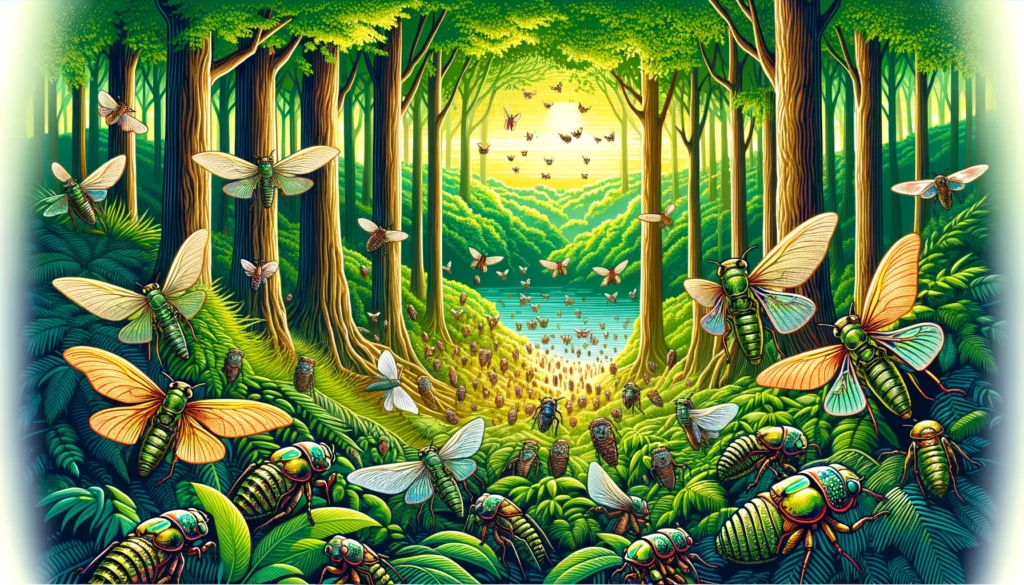Although cicadas can be unnerving and outright spooky in big numbers, they’re not harmful at all. Even if they wanted to bite or sting, they don’t have the body parts for it. They don’t destroy crops like locusts, and they aren’t poisonous or toxic (although your pets wouldn’t be able to digest them). All in all, cicadas aren’t really dangerous, although they can damage some plants.

Cicadas are not locusts — and not dangerous to plants
Every few years, parts of the United States become the stage for one of nature’s most spectacular and noisy events — the emergence of cicada broods. These insects, known for their loud mating calls and remarkable life cycles, typically live underground for most of their lives before emerging en masse. This year is special as it marks the simultaneous emergence of two broods: a 17-year brood and another on a 13-year cycle.
Periodical cicadas are insects belonging to the order Hemiptera, suborder Auchenorrhyncha. Unlike locusts, which they are often mistakenly compared to, cicadas are not voracious plant eaters, nor do they form swarming clouds that devastate crops. Instead, they emerge occasionally to reproduce, and do relatively little harm to their surroundings.
Their life cycle is one of the longest of any insect, with periods ranging from 1 to 17 years, most of which is spent as nymph underground. While underground, cicadas feed on the juices and sap of tree roots. Then, right before emerging, they eat more than usual and can cause some damage to plants. However, even during a great emergence, the only damage adult cicadas are likely to cause to plants is by laying eggs.
When female cicadas lay eggs, they make small cuts into tree bark to deposit their eggs. This can cause some damage, but is unlikely to trigger widespread damage in healthy plants. For young saplings or ornamental plants, this can pose a risk, and gardeners are advised to cover these plants with netting during a major cicada emergence to protect them from egg-laying. However, for most mature trees, the damage is minimal and part of a natural pruning process.
Cicadas are not dangerous to humans
Physically, cicadas are harmless. They do not bite or sting defensively, nor do they possess any mechanism with which to do so. You could find yourself swarmed by cicadas and you’d suffer no physical damage at all.
There are no known diseases transmitted by cicadas, making them less of a health hazard than many insects that bite or sting. There is, however, a small segment of the population that may experience allergic reactions. These reactions are not caused by the cicadas themselves but by the mold that can grow on their exuviae (shed skins) and dead bodies. In such cases, allergies can be triggered during and after a large emergence.
The cacophony they make may also be annoying, but it’s no more than just that — annoying.
While cicadas can be incredibly loud, especially in years where broods overlap as they do now, their noise does not pose a threat to human health. It can be a nuisance, particularly in suburban and rural areas where they are most prevalent, but the sound is not harmful. In fact, many people find the cyclic emergence of cicadas to be quite pleasant and natural.
Pet owners need to be a bit careful
For pets, cicadas present a different sort of challenge. Dogs, in particular, may try to eat the cicadas, which, while not toxic, can cause digestive upset or blockages if consumed in large quantities. Veterinarians often recommend keeping an eye on your pet to prevent them from overindulging.
Simply put, if your dog eats a cicada, it’s no biggie. But if they try to splurge at an all-you-can-eat cicada buffet, they can have blockages.
The same goes for cats. Cats are less inclined to eat random things from outside, but they may still fancy a cicada treat. As cats are typically smaller than dogs, they don’t need to eat as much to potentially get into trouble.
The bottom line, if you have pets and are in a cicada area, keep an eye on them. If you suspect they’ve eaten some cicadas and act suspiciously (like seem more depressed than usual or avoiding eating), a trip to the vet can help ease the suspicions.
No cicada-geddon
Every time cicadas emerge, it can seem like a bit of a cicada-geddon with the sheer numbers and noise. But, it’s important to remember that this is a normal, natural process, and not an invasion or a disaster.
Cicadas are not really dangerous and, at most, they can cause damage indirectly through accidental ingestion (by pets) or through some allergies.
For residents in areas expecting cicadas, preparation can make the experience less disruptive. Covering young trees and shrubs with netting can protect them from egg-laying damage. Keeping windows closed or using white noise can help mitigate the impact of the sound. If you’re allergy prone, it’s probably safest to avoid interacting with cicadas.
So, as we witness these insects take to the skies from underground, let’s not treat them as a nuisance, but as a striking natural phenomenon. Cicada broods don’t come out every year, let alone two broods at the same time. This is a spectacular event, not one to be feared.









